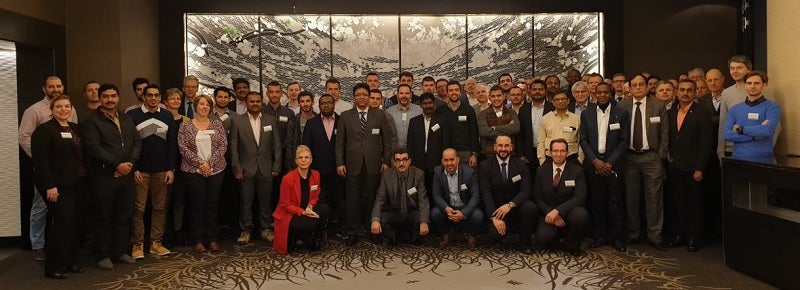
On 13 and 14 November 2019, the LOESCHE Training Center opened its doors for the eighth Technical Seminar in Duesseldorf. The completely sold-out event offered a platform for sharing knowledge and exchanging experiences.
This is already the eighth time the LOESCHE Training Center in Duesseldorf has held the open Technical Seminar. The event’s motto was “resource-efficient strategies in cement production” and was primarily aimed at process and maintenance personnel in the cement industry. The focus was on the exchange of expert knowledge and practical experience.
A total of 65 visitors and contributors from 22 nations, including Macedonia, Burkina-Faso, Saudi Arabia, Syria, India and Bangladesh took part. The event began on the 12th of November with an informal evening of introductions in the Media Harbour in Duesseldorf. The seminar itself took place on 13 and 14 November.
The following themes were presented and discussed:
Dr Christina Fleiger from the VDZ (Verein deutscher Zementwerke, the association of the German cement industry) presented an objective overview of the state of research of CCUS technologies (Carbon Capture, Utilisation and Storage) and the possibilities for their use in industry.
Dr Erwin Schmidl, WhiteLabel-TandemProject e.U., spoke on the use of alternative fuels in cement production. He demonstrated the challenges, impacts and solutions stemming from the use of alternative fuels in the cement industry.
Following this, Taís Mazza Joudeh introduced LOESCHE’s first experiences with waste conditioning plants in the US. Dr Stefan Kern, Managing Director of A-TEC in Austria, spoke on chlorine bypass systems and an integrated approach for waste-free reworking of bypass dust.
LOESCHE’s Dr Roland Aeckersberg explained, by way of numerous practical examples, how coal grinding plants can be run as safely and risk-free as possible.
The first day’s closing keynote lecture, delivered by Dr Winfried Ruhkamp, offered an interesting glance into the near future. He presented the promising results of LOESCHE’s experiments on grindability with innovative cement composites in vertical roller mills.
The first seminar day ended 170m in the air, at Duesseldorf’s Rhine Tower, where participants enjoyed Japanese cuisine and the astonishing view from Germany’s highest restaurant. The second day began with a lecture on wear, repairs and the management of spare parts. Hans-Georg Stengel provided insight into his long experience working in LOESCHE installation supervision.
An introduction to the basics of process technology in running a grinding plant was given by Stefan Tübergen, a process engineer at LOESCHE. In a second lecture that afternoon, he spoke on measurements and control loops in a grinding plant.
In his lecture, Dr Dorival Tecco clearly demonstrated how grinding productivity can be significantly improved with a solid understanding of the basics of wear dynamics.
Robert Koert from LOESCHE Customer Service then presented a project on the successful overhaul and modernisation of two LM 28.2 type LOESCHE mills, which had been in operation for more than 40 years.
The second day also ended with a look at the near future. In his keynote lecture, LOESCHE’s Chief Digital Officer Ralph Viebrock presented a state-of-the-art approach to digital maintenance planning.
The so-called ‘World Café’ has already become tradition as a recurring part of the seminar: in modern, interactive short workshops, all participants and speakers had the chance to discuss topics and questions in a relaxed atmosphere. Under the motto “everybody’s an expert”, these short discussions allowed for an equal exchange of personal experiences and knowledge.
The LOESCHE Technical Seminar was a great benefit for all who participated. The feedback from attendees turned out accordingly.
“The seminar on innovations for vertical roller mills was a great help. We’ll come back with more engineers and technicians in the future. And many thanks for the preparation, organisation and hospitality,” said one participant from the Cement Company of Northern Nigeria.
Organisers Theodora Bruns und Dr Regina Krammer also found this seminar to be the most successful ever.
“On top of interesting lectures and the chance to bring in personal experiences, we were also able to discuss solutions together and make a great many contacts. The quality of the seminar wasn’t just down to the expertise of the speakers but also the active participation of all those who attended the programme. We’re already looking forward to the upcoming LOESCHE Seminars in 2020,” said Regina Krammer.

